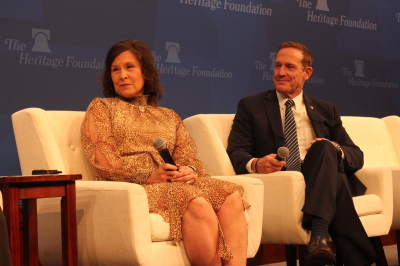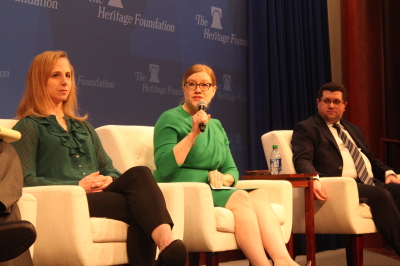Higher education fueling decline in marriage, birth rate: policy expert

WASHINGTON — A conservative policy expert highlighted the role higher education is playing in the decline of marriage and total fertility, as more people opt to take more time to pursue college degrees, which she warned is extending their adolescence and deferring certain responsibilities.
On Wednesday, the Heritage Foundation hosted an event titled, "The Birth Dearth: Why the Decline in Marriage and Total Fertility Is a Genuine Crisis."
“The demographic crisis in the United States is real and a threat to society as we know it. The U.S. and almost all developed countries are failing to replace their populations,” the description for the event reads. “In 2022, the total fertility rate (TFR) in the U.S. was 1.665 births per woman aged 15-44. This is well below the necessary replacement level of 2.1 births per woman. Among the 38 countries in the Organization for Economic Cooperation and Development (OECD), fertility was even lower.”

The opening discussion featured Sen. Ted Budd, R-N.C., and his wife of 30 years, Amy Kate Budd, who talked about the joy that comes from marriage and raising children. After the conversation with the Budds, the event moved onto two separate panel discussions featuring various policy experts from the conservative think tank.
Lindsey Burke, director of the Heritage Foundation’s Center for Education Policy, spoke during the last panel, which proposed potential solutions to the decline in marriage and total fertility.
The policy expert noted that a majority of undergraduate students now take six years to complete a four-year degree, thus delaying marriage and family life.
Burke referenced an August 2023 Heritage Foundation paper she published on the subject alongside the Center for Education Policy’s Senior Research Fellow, Jay P. Greene. During the panel, Burke highlighted a point addressed in the paper, noting that this extension of schooling typically leads to an “extended adolescence.”

“A period of limbo during which people who historically would have taken on adult roles of work and family largely defer assuming those responsibilities,” Burke said, citing data from within the past decade that shows the median age for men is 30.5 years old for men and 28.6 years old for women.
Burke also noted that the median age of women at the time of the birth of their first child has increased by three years since 1990. According to the scholar, the delay in marriage and family formation within the last decade has happened at the same time the nation is seeing an increase in enrollment in higher education and graduate school.
“I would like to suggest that there are two other ways that college may be contributing to the birth dearth,” Burke said. “The first is this perceived debt burden among those who borrow to attend college, and the second is through the message that higher education sends to those who attend college.”
At the individual level, according to Burke, someone who graduates college and enters the workforce has an average debt of around $222 a month, which the policy expert argued is “manageable.” The greater threat, however, is the message that colleges promote about marriage and family, according to Burke.
The researcher referenced a February paper published by a professor who compared “marriage fundamentalism” to “structural racism,” arguing that an ideology that promotes a two-parent family “is a key structuring element of white heteropatriarchal supremacy.”
“We’re telling too many people to go to college more and more and that college is the only way to success,” Burke said. “More time in higher education is prolonging adolescence and delaying marriage and family formation."
Regarding potential solutions, one of the scholar’s proposals included “restoring the value and dignity” of vocational education and cutting off what she described as the “open spigot of federal aid.”
Burke also condemned canceling student loan debt, which the Biden administration has championed, as she argued that this would only shift the “burden” onto working families.
“We have to think about reorienting higher education,” Burke said in response to a question from The Christian Post about how to address the messaging from colleges about marriage and families. “To my mind, the way that you do that is to remove these federal subsidies that are out there.”
“And so, until we are willing to cut off that open spigot, and until we are willing to say we're not going to, quote, ‘forgive student loans on the back end,’ colleges are going to have free reign to continue."
Samantha Kamman is a reporter for The Christian Post. She can be reached at: samantha.kamman@christianpost.com. Follow her on Twitter: @Samantha_Kamman



























